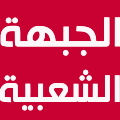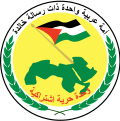Country Emblem Name Abbr. Leader Founded Ideology Legislature Notes Algeria National Liberation Front جبهة التحرير الوطني
NLF Abdelkrim Benmbarek 23 October 1954 Arab nationalism Algerian nationalism
Pan-Arabism
Anti-imperialism
Arab socialism
National Assembly : Government Dignity Party حزب الكرامة
DP Mohamed Eddaoui 1997 Nasserism Left-wing nationalism
Democratic socialism
Left-wing populism
National Assembly : Opposition Egypt Link to image National Progressive Unionist Rally Party حزب التجمع الوطني التقدمي الوحدوي
NPU Sayed Abdel Aal [ 3] 1977 Nasserism Left-wing nationalism
Democratic socialism
Left-wing populism
House of Representatives : Opposition Arab Democratic Nasserist Party الحزب العربى الديمقراطى الناصرى
ADN Sameh Ashour 19 April 1992 Arab nationalism Arab socialism
Pan-Arabism
Nasserism
House of Representatives : Extra-parliamentary Iraq Popular Movement in Iraq الحزب العربى الديمقراطى الناصرى
PMI Sheikh Mohammed Taha al-Hamdoun 2011 Sunni Arab interests Iraqi nationalism
Federalism
Council of Representatives : Extra-parliamentary Israel United Arab List لقائمة العربية الموحدة
UAL Mansour Abbas 1996 Conservatism [ 4] Israeli Arab interests
Two-state solution
Islamism [ 5] [ 6]
Islamic democracy [ 7]
Social conservatism
Knesset : Opposition The Democratic Front for Peace and Equality الجبهة الديمقراطية للسلام والمساواة
Hadash Ayman Odeh 15 March 1977 Communism Eco-socialism
Israeli Arab interests
Two-state solution
Non-Zionism
Knesset : Opposition Arab Movement for Renewal الحركة العربية للتغيير
Ta'al Ahmad Tibi 1990s Arab nationalism [ 8] [ 9] Israeli Arab interests
Secularism [ 8] [ 9]
Two-state solution
Knesset : Opposition Balad Party بلد
Balad Sami Abu Shehadeh 1995 Arab nationalism [ 10] Left-wing nationalism [ 11]
Secularism [ 12]
Anti-Zionism [ 13]
Knesset : Extra-parliamentary Jordan Link to image Islamic Centre Party حزب الوسط الاسلامي
ICP Madalla al-Tarawneh December 2001 Islamic democracy Arab nationalism
Chamber of Deputies : Extra-parliamentary National Current Party حزب التيار الوطني
NCP Saleh Rusheidat 2009 Jordanian nationalism Arab nationalism
Pan-Arabism
Chamber of Deputies : Extra-parliamentary Jordanian Arab Socialist Ba'ath Party حزب البعث العربي الاشتراكي الأردني
Ba'ath Akram al-Homsi 1966 Neo-Ba'athism Arab nationalism
Saddamism
Chamber of Deputies : Extra-parliamentary Lebanon Progressive Socialist Party الحزب التقدمي الإشتراكي
PSP Walid Jumblatt 1 May 1949 Social democracy Third Way
Democratic socialism
Arab nationalism
Pan-Arabism
Parliament of Lebanon : Opposition Dignity Movement تيار الكرامة
ALP Faisal Karami 1966 Arab nationalism Anti-Zionism
Pan-Arabism
Parliament of Lebanon : Opposition Union Party حزب الإتحاد
UP Abdul Rahim Mrad 1960 Nasserism Pan-Arabism
Parliament of Lebanon : Opposition Arab Socialist Ba'ath Party – Lebanon Region حزب البعث العربي الاشتراكي في لبنان
ASBP–LR Assem Qanso 1950 [ 14] Socialism Arab nationalism
Ba'athism
Parliament of Lebanon : Opposition Popular Nasserist Organization التنظيم الشعبي الناصري
PNO Osama Saad 1973 Nasserism Arab socialism
Arab nationalism
Pan-Arabism
Anti-Zionism
Left-wing nationalism
Parliament of Lebanon : Opposition Mauritania Link to image Sawab حزب الصواب
Sawab Abdel Salem Ould Horma 23 May 2004 Ba'athism Arab nationalism
Parliament of Mauritania : Opposition People's Progressive Alliance Alliance populaire progressiste
PPA Messaoud Ould Boulkheir Nasserism Social democracy
Parliament of Mauritania : Extra-parliamentary Socialist Democratic Unionist Party الحزب الوحدوي الاشتراكي الديمقراطي
SDU Mahfouz Weld al-Azizi 20 September 1994 Neo-Ba'athism Arab nationalism
Parliament of Mauritania : Extra-parliamentary Morocco Istiqlal Party PI Nizar Baraka April 1937 Conservatism [ 15] Arab nationalism [ 16] [ 17] Monarchism House of Representatives : Opposition Palestine Link to image Popular Front for the Liberation of Palestine الجبهة الشعبية لتحرير فلسطين
PFLP Ahmad Sa'adat 1967 Anti-Zionism [ 18] [ 19] Pan-Arabism
Arab nationalism [ 20]
One-state solution
Legislative Council : Opposition Syria Arab Socialist Union Party of Syria حزب الاتحاد الاشتراكي العربي في سورية
ASU Safwan al-Qudsi 1973 Arab nationalism Arab socialism
Nasserism
Pan-Arabism
Left-wing nationalism
People's Assembly : Banned Link to image Socialist Unionist Party حزب الوحدويين الاشتراكيين
SUP Fayiz Ismail 1962 Nasserism Arab nationalism
Arab socialism
People's Assembly : Banned Link to image National Covenant Party حزب الوحدويين الاشتراكيين
NCP Fayiz Ismail 1972 Arab nationalism Arab socialism
Islamic socialism
People's Assembly : Banned Arab Democratic Union Party حزب الاتحاد العربي الديمقراطي
ADU Iyad Ghassan Osman [ 21] Arab nationalism Nasserism
People's Assembly : Banned Tunisia Democratic Current التيار الديمقراطي
DC Ghazi Chaouachi 30 May 2013 Social democracy Third Way
Nationalism
Progressivism
Pan-Arabism [ 22]
Assembly : Extra-parliamentary Link to image People's Movement حركة الشعب
PM Zouhair Maghzaoui 2005 Secularism Democratic socialism
Nasserism
Arab nationalism
Assembly : Opposition Popular Front الجبهة الشعبية
PF Hamma Hammami [ 23] 7 October 2012 Socialism Secularism
Arab nationalism
Pan-Arabism
Assembly : Extra-parliamentary Yemen Yemeni Socialist Party الحزب الاشتراكي اليمني
YSP Abdulraham Al-Saqqaf 13 October 1978 [ 24] Social democracy Arab nationalism
House of Representatives : Opposition Nasserist Unionist People's Organisation التنظيم الوحدوي الشعبي الناصري
NUP Abdulmalik Al-Mekhlafi 25 December 1965 Nasserism Yemeni unionism
House of Representatives : Opposition Arab Socialist Ba'ath Party – Yemen Region حزب البعث العربي الاشتراكي - قطر اليمن
ASBP–YR Mohammed Al-Zubairy 1951 Ba'athism Arab socialism
House of Representatives : Opposition 























